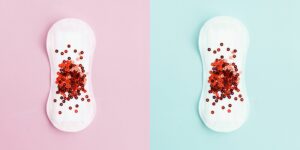Nutrition during pregnancy
Nutrition during pregnancy is really important for both the mother and the embryo. A healthy diet is an important part of a healthy lifestyle during pregnancy because it will help your baby to develop and grow. No special diet is necessary. Rather, it’s important to consume a variety of different foods daily in order to achieve a good balance of nutrients that both you and your baby need. Some doctors might recommend taking supplements during pregnancy but it is better to get the vitamins and minerals from the foods you eat. Regardless, it’s always best to consult with your doctor.
Feeling hungry
You might feel extra hungry during pregnancy but there is no need to “eat for 2”, regardless of whether you’re expecting twins or triplets. A good solution is to have healthy breakfasts every day so that you can avoid snacking on foods high in fat and sugar later in the day. That doesn’t necessarily mean that you have to cut out all your favourites. It just means that you will have to reduce the amount of certain types of food that you consume, such as sugary and salty snacks.
The Eatwell Guide
The Eatwell Guide can help you balance your diet because it shows you how much of what you eat should come from each food group to achieve a healthy, balanced diet. You can extend the time when you balance your diet based on this guide over the week.
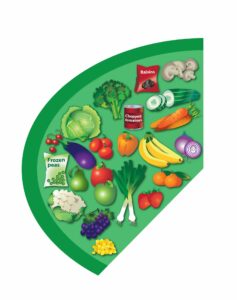
It’s very important to aim to eat at least 5 portions of a variety of fruit and vegetables and should be over a third of the food you eat each day. You can choose from fresh, frozen, tinned, dried or juiced (no more than 150ml a day). Fruit and vegetables are a good source of vitamins, minerals and fibre.
During pregnancy, eating plenty of fruits and vegetables can help with digestion and constipation.
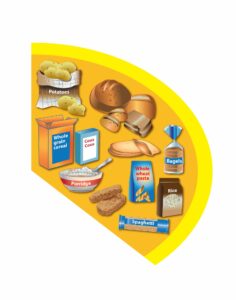
Starchy food, like potatoes, cereal and bread, should make up just over a third of the food you eat. It’s better to choose higher fibre wholegrain varieties, such as wholewheat pasta and brown rice, or simply leave skins on potatoes. These foods are a good source of energy and the main source of a range of nutrients.
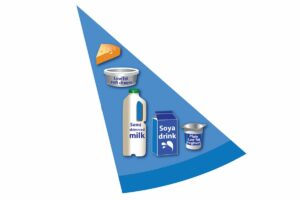
Dairy products, such as milk, cheese, yoghurt and creams, are good sources of protein and some vitamins. They’re a source of calcium, which helps keep bones strong. A recommendation is to go for lower-fat and lower-sugar products, like 1% fat milk, reduced-fat cheese or plain low-fat yoghurt. If you prefer dairy alternatives, such as soya drinks and yoghurts, choose unsweetened, calcium-fortified versions. Avoid unpasteurised cheeses.
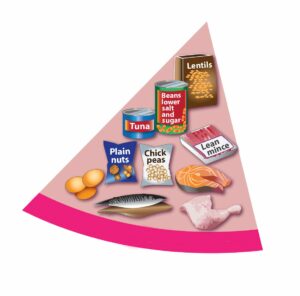
Foods rich in protein, vitamins and minerals include beans, peas and lentils. These can be good alternatives to meat because they’re lower in fat and higher in fibre and protein. As for meat, choose lean cuts of meat and mince, and try to eat less red and processed meat like bacon, ham and sausages. Make sure that the meats are cooked very thoroughly until steaming all the way through with no pink in them. A good recommendation is 2 portions of fish every week, 1 of which should be oily, such as salmon or mackerel. Fish to avoid when pregnant are shark, swordfish and marlin. Also avoid eating raw or partially cooked eggs.
Foods to avoid
- Sugary foods and drinks are high in calories and can contribute to weight gaining and tooth decay.
- Fat in very high in calories can increase the levels of cholesterol in your blood and the chance of developing a heart disease
For more information,visit also https://www.nhs.uk/pregnancy/keeping-well/foods-to-avoid/
Preparing food safely
- Wash fruit, vegetables and salads to avoid harmful chemicals that may be in traces of soil
- Wash all surfaces and utensils, and your hands to avoid food poisoning
- Make sure that raw foods are stored separately
- Use a separate knife and chopping board for raw meats
Sources
NHS. Have a healthy diet in pregnancy. Available from: https://www.nhs.uk/pregnancy/keeping-well/have-a-healthy-diet/
Johns Hopkins Medicine. Nutrition During Pregnancy. Available from: https://www.hopkinsmedicine.org/health/wellness-and-prevention/nutrition-during-pregnancy


